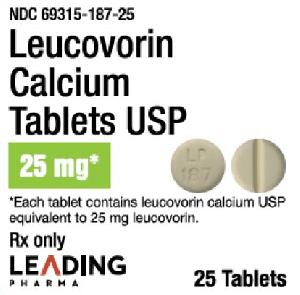Leucovorin Disease Interactions
There are 4 disease interactions with leucovorin.
Leucovorin (applies to leucovorin) anemia
Major Potential Hazard, High plausibility. Applicable conditions: Anemia of Unspecified Nutritional Deficiency
The use of leucovorin is inappropriate therapy for patients with undiagnosed anemia. Leucovorin can obscure the diagnosis of pernicious anemia by alleviating the hematologic conditions and allowing progression of neurologic complications.
Leucovorin (applies to leucovorin) GI toxicity
Major Potential Hazard, Moderate plausibility. Applicable conditions: Diarrhea, Vomiting
Leucovorin enhances the toxicity of 5-fluorouracil. When these drugs are administered concurrently in the palliative therapy of advanced colorectal cancer, gastrointestinal toxicities, particularly stomatitis and diarrhea are observed more commonly and may be more severe and of prolonged duration. Therapy with these agents must not be initiated or continued in patients who have symptoms of gastrointestinal toxicity of any severity until those symptoms have completely resolved. Monitor patients experiencing diarrhea and institute appropriate care.
Leucovorin (applies to leucovorin) renal impairment
Moderate Potential Hazard, Moderate plausibility. Applicable conditions: Renal Dysfunction
Leucovorin is excreted by the kidney and the risk of toxic reactions to the drug may be greater in patients with impaired renal function. Leucovorin should be used cautiously on these patients, and care should be taken in dose selection. Monitoring of renal function is recommended.
Leucovorin (applies to leucovorin) seizures
Moderate Potential Hazard, Low plausibility.
Seizures have occurred rarely during administration of leucovorin, primarily in patients receiving high dose leucovorin or leucovorin in combination with 5-fluorouracil, or in patients with a history of seizures or central nervous system abnormalities (unspecified). Folic acid in large amounts may counter the anticonvulsant effects of phenobarbital, phenytoin, and pimozide. Clinical monitoring of seizure activity is recommended and modification of anticonvulsant therapy may be necessary.
Switch to professional interaction data
Leucovorin drug interactions
There are 28 drug interactions with leucovorin.
More about leucovorin
- leucovorin consumer information
- Check interactions
- Compare alternatives
- Pricing & coupons
- Drug images
- Side effects
- Dosage information
- During pregnancy
- Drug class: antidotes
- Breastfeeding
Related treatment guides
Drug Interaction Classification
| Highly clinically significant. Avoid combinations; the risk of the interaction outweighs the benefit. | |
| Moderately clinically significant. Usually avoid combinations; use it only under special circumstances. | |
| Minimally clinically significant. Minimize risk; assess risk and consider an alternative drug, take steps to circumvent the interaction risk and/or institute a monitoring plan. | |
| No interaction information available. |
See also:
Further information
Always consult your healthcare provider to ensure the information displayed on this page applies to your personal circumstances.


